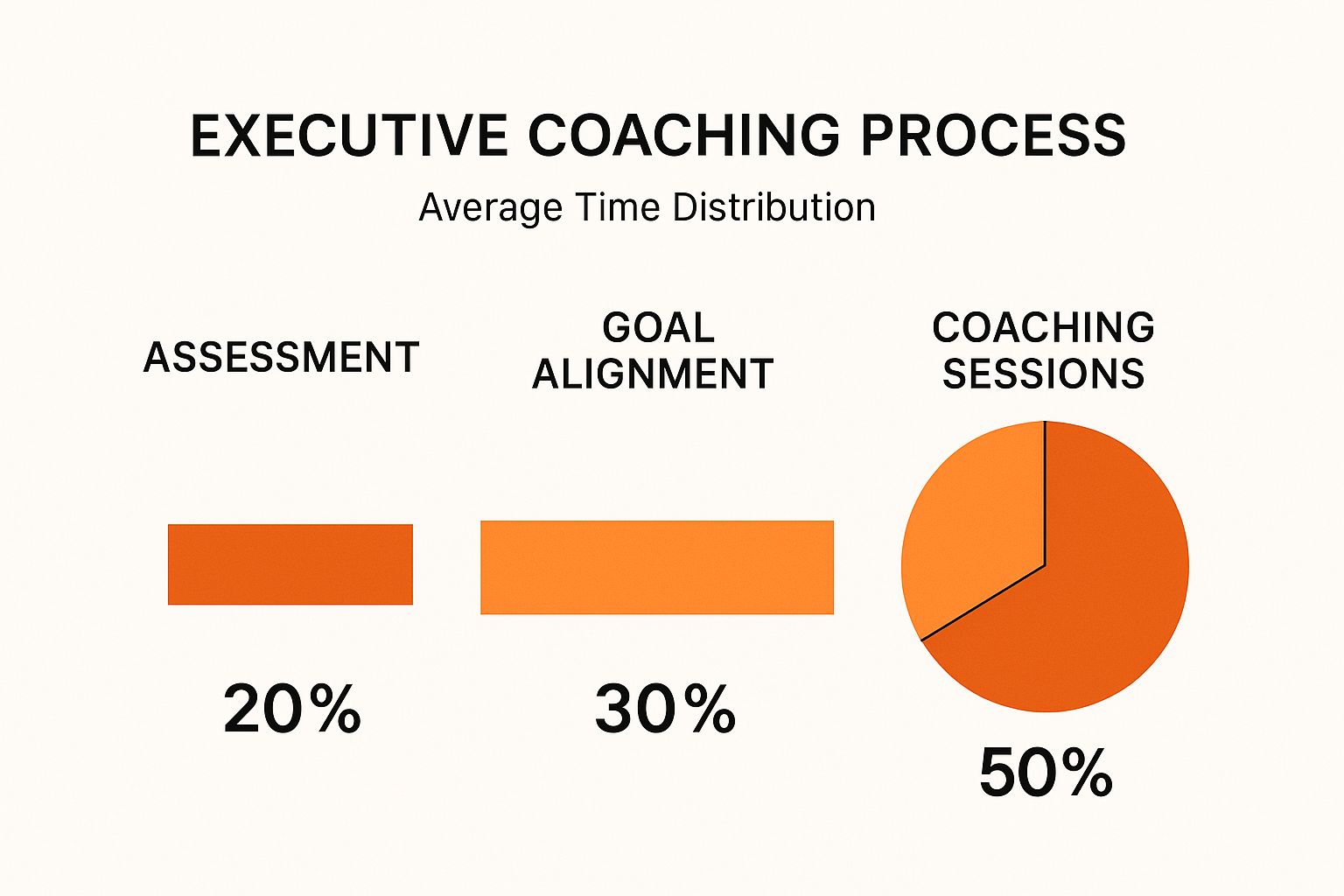Executive coaching is, at its heart, a confidential one-on-one partnership. It's designed to take a leader’s performance and help them reach their absolute full potential. Think of it like a world-class athlete who relies on a coach to refine their technique and master game-day strategy. In the same way, an executive coach helps top-tier leaders sharpen their self-awareness, improve their decision-making, and deliver truly impactful results. It's a proactive investment in growth, not a fix for something that's broken.
What Exactly Are Executive Coaching Services?
Picture a highly skilled ship's captain navigating treacherous waters. The captain is an expert at sailing, but having a trusted advisor with a map of hidden currents and a telescope for the horizon gives them a critical advantage. This is the very essence of executive coaching services; it’s a strategic alliance that helps a leader move from simply being a high performer to making an extraordinary impact.
This partnership creates a structured and completely confidential space. Here, a leader can be vulnerable, dig into complex challenges, and get unbiased feedback they wouldn't get anywhere else. The coach acts as a strategic thinking partner, helping the executive see their own blind spots and find new ways to look at stubborn problems. It's a dedicated time for reflection and growth, away from the constant pressure of day-to-day operations.
Beyond Mentoring and Consulting
It’s really important to understand how coaching differs from other professional development tools. A mentor, for example, gives advice based on their personal career path. A consultant is brought in to provide expert solutions for specific business problems. A coach works differently. They use powerful questioning, deep listening, and proven frameworks to help leaders discover their own answers.
The core belief in coaching is that the leader already has the creativity and resources to solve their own challenges. The coach’s job is to help them find and use those resources effectively.
This difference is everything. The objective isn't to create a dependency on the coach. It's to build the leader's own ability for insight, resilience, and strategic thinking long after the coaching engagement ends.
A Focus on Action and Outcomes
Executive coaching isn't just a series of pleasant, directionless chats. Every single engagement is built around clear, measurable goals that line up with what the individual wants to achieve and what the organisation needs strategically.
These goals often fall into a few key areas:
- Sharpening Leadership Skills: This could mean improving communication, delegation, influence, or the ability to motivate teams.
- Navigating Transitions: Coaching is incredibly valuable when managing a new role, a major team reorganisation, or a big strategic shift in the company.
- Enhancing Strategic Thinking: It helps leaders move from day-to-day tactical management to becoming a more visionary leader.
- Boosting Emotional Intelligence: This involves mastering self-awareness and empathy to build stronger professional relationships and a healthier company culture.
By zeroing in on areas like these, coaching creates a direct line between personal development and real business results. This process is a crucial part of a leader's journey, and for anyone looking to map out their professional path, knowing how to build a career development plan can perfectly supplement the work done with a coach. Ultimately, executive coaching is the catalyst that unlocks a leader's untapped potential, turning good leaders into truly great ones.
The Real ROI of Executive Coaching

When a company invests in executive coaching, it's easy to focus on the individual leader. But the true return on that investment is far broader. The effects ripple outwards, touching every part of the business—improving team dynamics, shaping a stronger company culture, and ultimately, driving real commercial results. This isn't just about polishing a few soft skills; it's a strategic move to fortify the very engine of your organisation: its leadership.
One of the first things you'll notice is a significant shift in a leader's strategic thinking. A good coach doesn’t just hand out answers. Instead, they ask probing questions that force an executive to look past the immediate fires and start anticipating what's next for the market. This improved foresight gives leaders the ability to "see around corners," allowing them to make proactive, innovative decisions that set the company up for long-term success.
This focus on future-proofing leadership is a key driver behind the industry's significant expansion. The global market for executive coaching and leadership development, which is flourishing in Germany and across Europe, is projected to swell from USD 103.56 billion in 2025 to USD 161.10 billion by 2030. This growth isn't arbitrary; it reflects a clear corporate strategy to secure a tangible return through superior leadership. You can explore more data on the growth of the executive coaching market.
Cultivating Resilience and Emotional Intelligence
Beyond pure strategy, a core benefit of coaching is the development of genuine resilience. Leaders are constantly navigating choppy waters, from economic headwinds to internal reorganisations. Coaching gives them the mental and emotional tools to manage stress, handle pressure with composure, and guide their teams through uncertainty with a steady hand.
At the same time, executive coaching hones a leader's emotional intelligence (EQ). Put simply, a high EQ is the ability to understand and manage your own emotions while recognising and influencing the emotions of those around you. It's a non-negotiable trait for anyone in a leadership role today.
Leaders with strong emotional intelligence create an atmosphere of psychological safety. Team members feel seen, heard, and valued, which makes them far more willing to share their best ideas and take smart risks. This directly translates into measurable improvements:
- Reduced Employee Turnover: Teams led by emotionally intelligent managers consistently report higher job satisfaction and loyalty.
- Increased Engagement: When people feel understood and supported, their engagement and productivity naturally increase.
- Improved Collaboration: High-EQ leaders are masters at navigating conflict and building a more cohesive, cooperative team spirit.
The Power of Empowered Delegation
A common—and often profound—breakthrough for leaders in coaching is learning to truly delegate. Many executives reach the top because they were brilliant individual contributors, but that same strength can become a major weakness at the senior level. A coach helps them make the crucial mindset shift from "doing" to "leading."
"My coach helped me see that by holding on to every task, I wasn't just burning myself out—I was actively preventing my team from growing. Learning to trust and delegate was the single biggest change I made, freeing me up to finally focus on the high-level strategy that only I could drive."
This shift is genuinely powerful. When a leader learns to delegate effectively, they aren't just offloading work; they are actively empowering their team. This builds capability throughout the organisation, develops the next generation of leaders, and frees the executive to focus on the high-value activities that will actually move the business forward. Suddenly, the return on investment is crystal clear: one person's development creates a more capable, motivated, and effective organisation.
Choosing Your Executive Coaching Format
Deciding to invest in executive coaching services is a major step. But an equally crucial decision is choosing the right format. There’s no one-size-fits-all answer here; the best approach is deeply personal and depends on a leader’s specific goals, the company culture, and even their preferred way of learning. Think of it as a strategic choice that will shape the focus, intensity, and ultimately, the results of your coaching journey.
The first fork in the road is deciding between a one-on-one engagement or a group setting. Each path offers unique benefits and is designed for different kinds of professional growth. Getting this first choice right is fundamental to building a coaching experience that truly delivers.
Individual Versus Group Coaching
One-on-one coaching is the classic model, and for good reason. It creates a completely confidential and personalised partnership between an executive and their coach. This format is perfect for navigating sensitive leadership issues, closing specific skill gaps, or preparing for a major promotion or career change. The agenda is 100% focused on the individual.
Group coaching, on the other hand, brings a small cohort of peers together. While an expert coach still facilitates the process, the dynamic is supercharged by peer-to-peer learning and shared wisdom. It’s an incredibly effective way to build consistent leadership skills across a management team or to foster a stronger support network among senior leaders.
A key insight from years of practice is that the structure of the coaching itself—individual or group, in-person or virtual—is not just a logistical detail. It is a strategic component that should be deliberately chosen to align with the specific developmental outcomes you wish to achieve.
The image below gives a clear sense of where the time in a typical engagement goes. The coaching sessions themselves are the heart of the process, which underscores why the format is so important.

As you can see, a full 50% of the engagement is dedicated to the actual coaching sessions. This makes your choice of format a critical factor in the partnership’s success.
Selecting the Right Delivery Model
After you’ve landed on an individual or group focus, the next layer is the delivery model: will it be in-person, virtual, or a hybrid of the two? Each has its own rhythm and suits different work styles and practical needs.
- In-person coaching is fantastic for building rapport and trust quickly. There’s a power to face-to-face interaction—reading body language, feeling the energy in the room—that can accelerate the relationship. Many engagements kick off this way to build a strong foundation.
- Virtual coaching offers unmatched flexibility. For leaders who are always on the move or working remotely, video calls remove all geographical hurdles. While it demands a bit more discipline from both coach and client, it can be just as powerful as meeting in person.
- A hybrid model aims for the best of both worlds. You might start with an intensive, in-person kick-off to forge that initial connection, then shift to regular virtual sessions for ongoing support and accountability. This blended approach is becoming the go-to for its balance of deep connection and practical convenience.
To make these distinctions even clearer, let's compare the most common formats side-by-side.
Comparison of Executive Coaching Formats
This table contrasts the most common executive coaching formats to help leaders and organisations choose the best approach for their specific goals.
| Coaching Format | Primary Focus | Best For | Typical Delivery |
|---|---|---|---|
| One-on-One | Deeply personalised development and addressing specific, sensitive leadership challenges. | Senior executives, leaders in new roles, or high-potentials needing targeted skill growth. | In-person, virtual, or a hybrid model. |
| Group Coaching | Developing common leadership skills and fostering peer learning and networking. | A management team, a cohort of new leaders, or cross-functional project leads. | Often a mix of in-person workshops and virtual group check-ins. |
In the end, the "right" format is whichever one gives the leader the best environment to reflect, learn, and put new ideas into action. Whether it's the quiet intensity of a one-on-one session or the collaborative energy of a group, making a deliberate choice is what sets the stage for success.
What a Typical Coaching Engagement Looks Like

If you're considering executive coaching, you're probably wondering what it actually involves day-to-day. It’s not just a series of vague chats. A professional coaching engagement is a structured journey with clear milestones, designed to deliver real, measurable change.
Most partnerships last between six and twelve months. This gives you enough time to dig deep, challenge old habits, and firmly establish new ways of thinking and behaving. It’s a deliberate process with a distinct beginning, middle, and end, built on a strong collaboration between you, your coach, and often, your organisation.
Phase 1: The Foundation and Discovery
It all starts with what we call a "chemistry meeting". This is an essential first conversation where you and a potential coach see if you click. Forget the CV for a moment; this is about personal connection. Trust and psychological safety are the bedrock of good coaching, so if the rapport isn't there, it's not the right fit.
Once you’ve found your coach, the real work begins with a discovery phase. Think of this as the diagnostic stage. The goal is to get a crystal-clear picture of your current reality as a leader. This typically involves:
- Initial Goal Setting: A three-way conversation between you, your manager, and the coach to agree on what success will look like.
- Stakeholder Interviews: The coach will often speak with your direct reports, peers, and boss to get a rounded view of your impact on the business.
- 360-Degree Feedback: This is usually a formal, anonymous survey. It gathers comprehensive feedback on your strengths and development areas from every angle.
This initial data-gathering ensures the coaching is laser-focused on the areas that will make the biggest difference for both you and the organisation.
Phase 2: The Coaching Sessions and Action
With a solid understanding established, you and your coach will build a detailed development plan together. This document isn't just a wish list; it turns the high-level goals from the discovery phase into specific, measurable actions and timelines. It becomes your roadmap.
The core of the engagement is the regular coaching sessions, usually held every two to four weeks. These are confidential, focused conversations where the magic happens. A great coach uses powerful techniques to spark new insights and drive you to action.
A coach’s job isn't to give you the answers. It’s to ask the right questions that help you find your own. The goal is to build your ability to solve problems and reflect on your own performance long after the coaching has finished.
In these meetings, you might find yourself challenged on old assumptions, role-playing a tough conversation, or learning a new framework to tackle a persistent problem. Between sessions, you’ll be expected to put what you've learned into practice. This is where theory meets reality.
For leaders who need specialised guidance on specific topics, platforms can offer on-demand expertise. You can learn more about connecting with an experienced consultant for 1:1 sessions to get targeted support.
Phase 3: Review and Sustainability
Towards the end of the engagement, the focus shifts. The goal now is to make sure your progress sticks. You want these new skills and mindsets to become second nature, not just a temporary fix.
This phase almost always includes a final review to measure how far you've come. Often, a second 360-degree assessment is used to provide concrete proof of the changes others have seen in your leadership style.
The process wraps up with a final meeting between you, your coach, and your sponsor. Here, you’ll review the outcomes, celebrate the wins, and map out a plan for your continued growth. This ensures the organisation sees a lasting return on its investment in you.
How to Select the Right Executive Coach

Finding the right coach is probably the single most important decision you'll make. It’s the factor that will ultimately determine how successful the entire engagement is. While countless professionals offer executive coaching services, what you're really looking for is a strategic partner, not just another vendor.
This means the selection process needs to be deliberate and thoughtful. It goes far beyond just scanning a CV or being wowed by a list of past clients. The best coaches bring a potent mix of proven expertise, relevant industry experience, and—crucially—the right personal chemistry. Choosing wisely from the start lays the groundwork for the trust and vulnerability that real growth requires.
Evaluating Credentials and Experience
Your search should always start with a look at a coach's formal qualifications. A truly credible coach has invested heavily in their own development, and this is usually reflected in their training and certifications. Keep an eye out for credentials from globally recognised bodies like the International Coaching Federation (ICF), which upholds high standards for both ethics and coaching competence.
This focus on formal qualifications is more than just a box-ticking exercise. In Germany, for example, the market for executive coaching certifications is expected to grow at a compound annual rate of about 11.5% through 2029. This isn't just a random statistic; it shows a clear trend of German companies prioritising certified coaches to ensure they’re getting high-calibre, strategic leadership development. You can find more detail on this growing demand for certified coaches here.
Beyond the paperwork, think about their industry experience. A coach doesn’t need to have held your exact job title, but having a firm grasp of your business world—its unique pressures, politics, and unspoken rules—is a massive advantage. That shared context makes for a much richer, more relevant conversation right from day one.
The Non-Negotiable Element of Chemistry
Credentials and experience might get a coach on your shortlist, but it's the "chemistry" that should get them the job. This is that intangible connection, the bedrock of any successful coaching relationship. It's that feeling of trust, rapport, and psychological safety that gives you permission to be completely open and honest.
A successful coaching engagement is a partnership built on mutual respect and trust. Without this fundamental chemistry, even the most qualified coach will struggle to create an environment where genuine reflection and change can occur.
You have to feel comfortable being vulnerable with your coach, sharing your biggest professional fears and insecurities without the worry of being judged. This isn't a standard supplier relationship; it’s a deeply personal alliance. If that connection feels off during your initial chat, trust your gut and keep looking. The right fit is out there.
Insightful Questions to Ask a Potential Coach
To really get a sense of both their competence and your chemistry, you need to ask better questions. The interview is your chance to dig into their philosophy, their style, and how they see the partnership. Remember, it’s a two-way street—you're interviewing them, but they’re also assessing whether they are the right person to help you.
Here are a few powerful questions to get the conversation rolling:
- Describe your coaching philosophy and methodology. This gets to the heart of the framework that guides their work.
- How do you establish trust and rapport with a new client? Their answer will tell you a lot about their approach to building the relationship.
- Can you share an anonymised example of a leader you coached through a challenge similar to mine? This tests their real-world experience without breaching confidentiality.
- How do you partner with clients to define and measure success? This shows their commitment to delivering tangible results.
- What are your expectations of me as a client (or consultee)? This clarifies the collaborative nature of the work ahead.
By asking these kinds of questions, you shift the dialogue from a simple credentials check to a meaningful conversation. It’s this process that will give you the confidence to pick a partner who is genuinely equipped to help you reach your goals. You can also explore our guide on the role you play as a consultee in a professional engagement.
Got Questions About Executive Coaching? Here Are Some Straight Answers
Even when the idea of executive coaching services makes sense, practical questions always come up. That’s completely normal. Getting these questions answered upfront is key to feeling confident about the decision and making sure everyone’s expectations are aligned.
Think of it as building a foundation. A great coaching relationship is built on trust and clarity, which is why we're so open about our own mission and the values that guide us. When you understand the 'why' behind the work, you can make a much more informed choice.
Let's tackle some of the most common questions we hear.
How Much Do Executive Coaching Services Typically Cost?
There's no single price tag for executive coaching. The cost really depends on what you need—things like the coach's background and experience, how long you'll work together, and how ambitious your goals are.
You'll usually see coaching offered in packages, not by the hour. A solid six- to twelve-month programme can run anywhere from €5,000 to over €25,000. Yes, it’s a significant figure, but top companies don’t see it as an expense. They see it as a high-stakes investment in their most important people. The real return comes from stronger team performance, keeping talented people on board, and actually seeing strategic plans come to life.
Is Coaching Different From Therapy or Consulting?
Absolutely, and it's a crucial distinction. While all three aim to help, they do it in very different ways. Getting this wrong from the start can lead to frustration and a feeling that the process isn't working.
Here’s a simple breakdown:
- Therapy looks backwards to help you heal and address emotional challenges that affect your overall well-being.
- Consulting brings in an expert to solve a specific business problem for you. They diagnose the issue and hand you the solution.
- Coaching is all about the future and your performance. A coach doesn't give you the answers; they partner with you to help you find your own solutions and build your own skills.
A coach's job is to empower you, not to direct you. The goal is to build your capacity to solve problems on your own, long after the coaching relationship ends. It’s about creating self-reliance, not a temporary crutch.
This focus on the future is what makes the growth stick. You’re not just getting a fix for today’s problem; you’re becoming a better leader for tomorrow’s challenges.
How Is the Success of Executive Coaching Measured?
Success isn't some fuzzy, feel-good concept. It's tied to the concrete goals you set at the very beginning of the engagement. We measure progress using a mix of hard numbers and real-world feedback to get a full picture.
On the quantitative side, we look at business impact. This could be anything from tracking your team’s Key Performance Indicators (KPIs) to seeing a jump in employee engagement scores or a better track record on project delivery.
Qualitative feedback is just as important. We often use 360-degree feedback, where we gather confidential input from your colleagues, your team, and your own manager. This provides clear evidence of change. Hearing that you're communicating more clearly, delegating more effectively, or showing up with more strategic insight is powerful proof that the coaching is making a real-world difference.
At iknowly, we connect you with verified German professionals for 1:1 consultations that can accelerate your career. Whether you need to refine your leadership style or plan your next strategic move, get personalised guidance from experts at top companies. Find your ideal consultant today.

